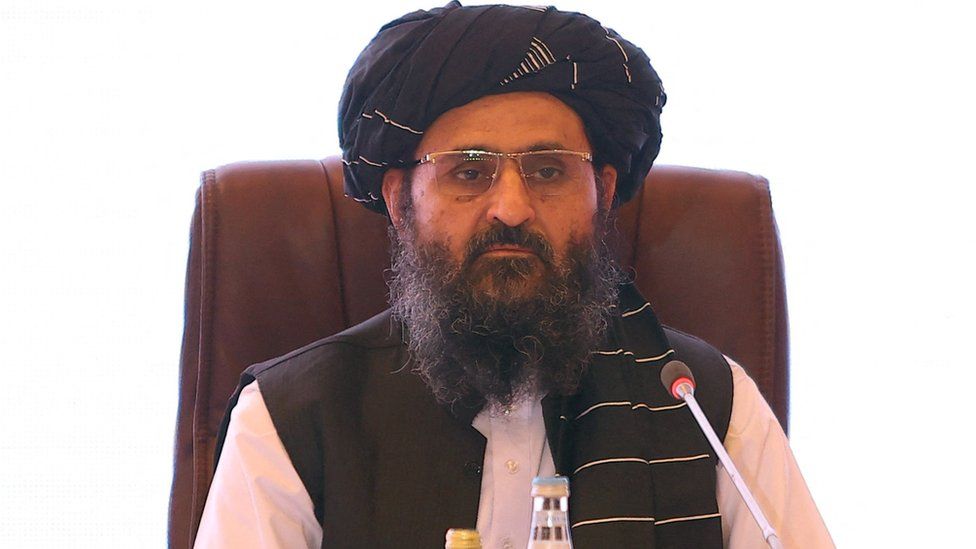
Afghanistan's acting deputy prime minister Mullah Abdul Ghani Baradar has appeared in a video to deny reports that he was injured in a clash with a rival faction of the Taliban.
The Taliban co-founder had disappeared from view for several days.
There have been reports of a row between Taliban leaders, involving Mr Baradar and a rival faction loyal to the powerful Haqqani network.
But in the new interview, Mr Baradar denied reports of internal strife.
"No, this is not true; I am OK and healthy," Baradar said, when asked about whether he had been hurt.
"I was out of Kabul and I did not have access to the internet to reject the fake news," he added.
The short clip - posted on Twitter by the Taliban's political office in Doha - showed him seated on a sofa next to a state television interviewer, apparently reading from a sheet of paper.
"Thank God we have good relations with each other and we respect each other. Our relations are even better than a family," he said.
Mr Baradar was the first Taliban leader to communicate directly with a US president, in a telephone conversation with Donald Trump in 2020. Before that, he signed the Doha agreement on the withdrawal of US troops on behalf of the Taliban.
- PROFILES: Who's who in the Taliban leadership
- INVESTIGATION: Taliban kill civilians in resistance stronghold
- VOICES: Uncertain times ahead for Afghan women
The new video comes after senior Taliban officials told the BBC that supporters of Mr Baradar brawled with a faction loyal to Khalil ur-Rahman Haqqani - the minister for refugees and a prominent figure within the militant Haqqani network.
The sources said the argument had broken out because Mr Baradar was unhappy about the structure of their interim government.
The row also reportedly stemmed from divisions over who in the Taliban should take credit for their victory in Afghanistan.
Mr Baradar reportedly believes that the emphasis should be placed on diplomacy carried out by people like him, while members of the Haqqani group - which is run by one of the most senior Taliban figures - and their backers say it was achieved through fighting.
The Haqqani network is associated with some of the most violent attacks that have occurred in Afghanistan against Afghan forces and their Western allies in recent years. The group is designated by the US as a terrorist organisation.
Its leader, Sirajuddin Haqqani, is the interior minister in the new government.
Rumours about a falling-out have been spreading since late last week, when Mr Baradar - one of the best-known faces of the Taliban - disappeared from public view. There was speculation on social media that he might have died.
The Taliban sources told the BBC that Mr Baradar had left Kabul and travelled to the city of Kandahar following the row.
Before the new interview was released, an official from the Taliban's cultural commission said on Twitter that the interview would be aired on state RTA TV to disprove "enemy propaganda".
The Taliban seized control of Afghanistan last month, and have since declared the country an "Islamic Emirate". Their new interim cabinet is entirely male and made up of senior Taliban figures, some of whom are notorious for attacks on US forces over the past two decades.

You might be interested in watching:
https://news.google.com/__i/rss/rd/articles/CBMiLmh0dHBzOi8vd3d3LmJiYy5jby51ay9uZXdzL3dvcmxkLWFzaWEtNTg1NTUyMzTSATJodHRwczovL3d3dy5iYmMuY28udWsvbmV3cy93b3JsZC1hc2lhLTU4NTU1MjM0LmFtcA?oc=5
2021-09-15 22:25:59Z
52781881239216
Tidak ada komentar:
Posting Komentar